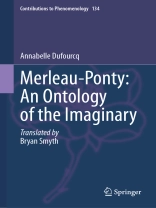This study brings to light the original concept of the imaginary that emerges from Merleau Ponty’s thought. It elucidates the main influences that contributed to shaping Merleau-Ponty’s theory of the imaginary and aims to show that this novel concept constitutes one of the most crucial yet challenging keys to his philosophy and ultimately his ontology.
This book develops the ontology of the imagery sketched by Merleau-Ponty and examines its practical implications. As its originally ambiguous and inseparable underside, the imaginary is just as central to Merleau-Ponty’s philosophy as perception. The author argues to enlarge the notion of reality by recognizing the imaginary dimension and “texture” of the real, and that Merleau-Ponty’s ontology of the flesh cannot be separated from an ontology of the imaginary. This monograph examines Merleau-Ponty’s conception of the imaginary against both his aesthetics, and his political philosophy – and appeals to students and researchers working in phenomenology and continental philosophy.
Зміст
Introduction.- Section I The Husserlian legacy and the initial motivations of Merleau Ponty’s thought: crisis of rationality, oneiric world, and risk of madness.- Introduction: crisis and imaginary.- The modern crisis.- Husserl’s greatest discovery according to Merleau Ponty: the Heraclitean flow, between reason and unreason.- The problem of authenticity in Merleau Ponty: humanity and world dissolved by the imaginary?.- Section II Imagination, nothingness, and inauthenticity in Sartre.- Introduction.- Consciousness is nothingness.- Image, imagination, and imaginary in Sartre.- Existence and the world: a froth of nothingness at the surface of Being.- The theatrics of existence.- The overcoming of the dualism of Being and Nothingness is prefigured in Sartrean philosophy.- Section III The Merleau Pontian definition of the imaginary as a particular register of phenomena alongside the real .- Introduction: thematization of the imaginary and definition of a broadened reality.- Merleau Ponty’s invocations of the Sartrean definition of the imaginary are inseparable from his critique of the opposition between Being and Nothingness.- Merleau Ponty’s critique of the Sartrean conception of the imaginary.- The genuine and even enhanced presence of the real in the imaginary.- The proximity between the Merleau Pontian redefinition of the imaginary and Bachelard’s philosophy.- Section IV The conquest of authenticity.- Introduction: “authenticity” and poetic depth.- Imaginary love: a necessary and fruitful failure General definition of the imaginary as institution.- Institutions and creative acts of taking up in an “authentic” deep and poetic existence.- Authenticity, imaginary, and reality.- Section V The imaginary is the true Stiftung of Being.- The imaginary as introduction to ontology and then as fundamental ontological model.- An ungraspable Urstiftung: Being as dehiscence.- Depth loves masks: Being as a play of images.- Conclusion.
Про автора
Annabelle Dufourcq is Professor of Philosophical Anthropology at Radboud University. She has published on the relation between the real and the imaginary in contemporary continental philosophy, with special interest in phenomenology. She is the author of ’La dimension imaginaire du réel dans la philosophie de Husserl’ (Springer 2010) and ‘The Imaginary of Animals’ (Routledge 2021).
Bryan Smyth is Instructional Assistant Professor at the University of Mississippi. His research deals primarily with phenomenology and critical social theory. He is the author of Merleau-Ponty’s Existential Phenomenology and the Realization of Philosophy (Bloomsbury, 2013), and he translated Merleau-Ponty’s The Sensible World and the World of Expression (Northwestern University Press, 2020).












